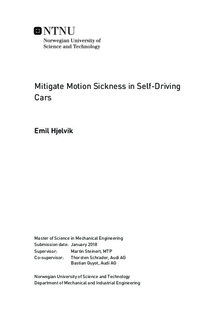Mitigate Motion Sickness in Self-Driving Cars
Master thesis
Permanent lenke
http://hdl.handle.net/11250/2615296Utgivelsesdato
2018Metadata
Vis full innførselSamlinger
Sammendrag
Motion sickness is an ancient problem lacking a silver bullet solution. Passengers are more prone to motion sickness than drivers, so as autonomous cars becomes the norm in the future, car sickness is projected to become a major problem. Motion sickness is expected to cause discomfort for hundreds of millions of people around the world. This does however give auto-manufactures an opportunity to differentiate themselves in the market if a good technical solution is developed. Motion sickness is quite complex, depending on sensory inputs and how the brain interprets them. Based on understanding how motion sickness occurs several strategies and techniques that can be useful against it is discussed. Validating the measures is currently done in an expensive and inaccurate manner, slowing down the research overall and makes smaller iterative improvements difficult. Autonomous cars allows for a new paradigm in motion sickness research, as driving patterns can be close to identical for participants. As test cars are driven with computer precision, research can be conducted in realistic scenarios instead of simulators which can't copy acceleration realistically, as well as causes simulator sickness which influences the results. If biometric data can be gathered in a non-intrusive manner and can be used to measure motion sickness in an accurate manner, data can be gathered cheaply and abundantly enough, to allow for a machine learning solution to replace current mathematical models of motion sickness.
